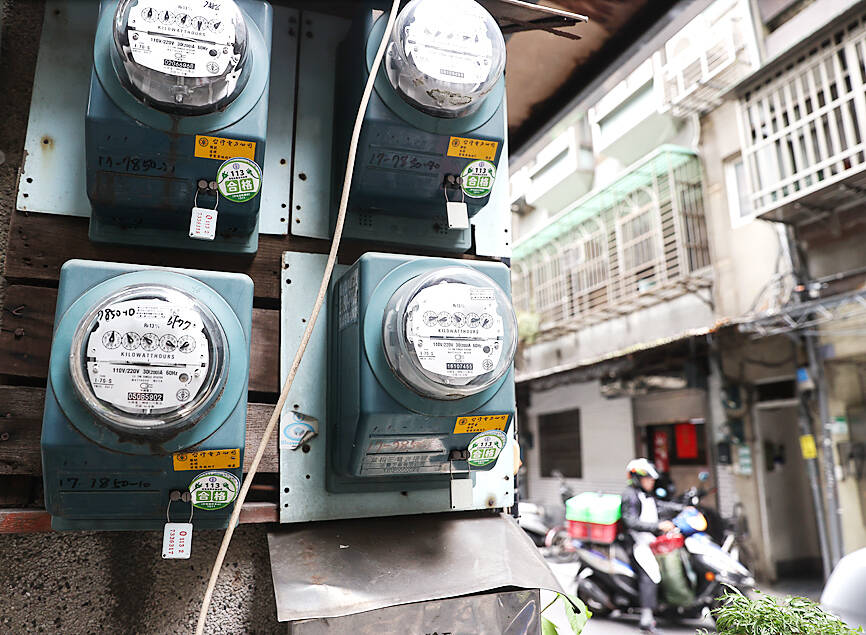The Ministry of Economic Affairs yesterday unexpectedly kept electricity rates unchanged amid concerns that global tariff hikes and geopolitical tensions have been creating economic uncertainty and price instability.
The ministry would instead continue to seek to have a NT$100 billion (US$3.02 billion) subsidy reinstalled by the legislature to help Taiwan Power Co (Taipower, 台電) stay afloat, Deputy Minister Lai Chien-hsin (賴建信) said.
“Members of the electricity price review committee did not talk much about rate adjustments, but focused their attention on the volatile international economic picture,” Lai told a media briefing that was delayed by one hour.

Photo: CNA
The decision came as a surprise, as the ministry had earlier hinted at an increase of 6 to 8 percent for different users, in line with growing international fuel costs.
US President Donald Trump on Wednesday announced a 25 percent tariff on imported vehicles starting on Thursday next week. He has also pledged to announce on Wednesday next week more extensive tariffs to address US trade imbalances with the rest of the world.
Tariff hikes would drive up production costs and inflationary pressure, while slowing the global economy, Lai said, adding that Taiwan would not emerge unaffected given its export-reliant economy.
The electricity rate freeze would cause NT$50 billion in losses for Taipower this year, he said, adding that the state-owned utility had posted cumulative losses of NT$422.9 billion in December last year.
The company has been operating at a loss to support the government’s price stabilizing efforts, he said.
Electricity price hikes have consistently fueled inflationary expectations and last year prompted the central bank to raise interest rates in March to subdue such expectations.
The monetary policymaker last week refrained from further raising interest rates on concerns that Trump’s tariff threats have already weakened consumer confidence and cast a shadow over the global economy.
The TAIEX plummeted 5.07 percent this month while the local currency depreciated against the US dollar, official data showed, as foreign portfolio managers slashed their holdings in emerging markets, including the local bourse.
Lai said it is unfair to blame Taipower for incurring losses, as the company has limited electricity price hikes to industrial and commercial users, while leaving prices for households largely unchanged to tame inflation.
That is why domestic electricity prices rose moderately relative to the steep hikes in South Korea and European countries after Russia invaded Ukraine in 2022, Taipower president Wang Yao-ting (王耀庭) said.
The ministry would ask Taipower to improve its financial standing through belt-tightening measures, while it continues to negotiate with the legislature, Lai said.
The deputy minister dismissed speculation that Taipower’s losses are related to the nation’s policy of retiring nuclear power and increasing the ratio of renewable energy sources.

KEEPING UP: The acquisition of a cleanroom in Taiwan would enable Micron to increase production in a market where demand continues to outpace supply, a Micron official said Micron Technology Inc has signed a letter of intent to buy a fabrication site in Taiwan from Powerchip Semiconductor Manufacturing Corp (力積電) for US$1.8 billion to expand its production of memory chips. Micron would take control of the P5 site in Miaoli County’s Tongluo Township (銅鑼) and plans to ramp up DRAM production in phases after the transaction closes in the second quarter, the company said in a statement on Saturday. The acquisition includes an existing 12 inch fab cleanroom of 27,871m2 and would further position Micron to address growing global demand for memory solutions, the company said. Micron expects the transaction to

Vincent Wei led fellow Singaporean farmers around an empty Malaysian plot, laying out plans for a greenhouse and rows of leafy vegetables. What he pitched was not just space for crops, but a lifeline for growers struggling to make ends meet in a city-state with high prices and little vacant land. The future agriculture hub is part of a joint special economic zone launched last year by the two neighbors, expected to cost US$123 million and produce 10,000 tonnes of fresh produce annually. It is attracting Singaporean farmers with promises of cheaper land, labor and energy just over the border.

US actor Matthew McConaughey has filed recordings of his image and voice with US patent authorities to protect them from unauthorized usage by artificial intelligence (AI) platforms, a representative said earlier this week. Several video clips and audio recordings were registered by the commercial arm of the Just Keep Livin’ Foundation, a non-profit created by the Oscar-winning actor and his wife, Camila, according to the US Patent and Trademark Office database. Many artists are increasingly concerned about the uncontrolled use of their image via generative AI since the rollout of ChatGPT and other AI-powered tools. Several US states have adopted

A proposed billionaires’ tax in California has ignited a political uproar in Silicon Valley, with tech titans threatening to leave the state while California Governor Gavin Newsom of the Democratic Party maneuvers to defeat a levy that he fears would lead to an exodus of wealth. A technology mecca, California has more billionaires than any other US state — a few hundred, by some estimates. About half its personal income tax revenue, a financial backbone in the nearly US$350 billion budget, comes from the top 1 percent of earners. A large healthcare union is attempting to place a proposal before